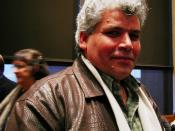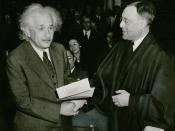In the course of a few weeks in the autumn of 2001, everything changed. A devastating terrorist attack occurred. It wasn't in Syria. More than 3,000 innocent people perished. It wasn't in Iran. The nation as a whole changed its perspective of who they were as a people. It wasn't in Pakistan. The global community felt the impact of the tragic loss of life and hideous method of attack. It wasn't in Jerusalem. For the people of the United States of America, September 11, 2001 changed everything. Many people began to once again realize that America is built on the people that make it up. We had lost sight of that a long time ago. As Ray Suarez says in his novel The Old Neighborhood, "Once we no longer had cultural cohesion, it was easier and easier to draw circles of concern more and more narrowly around one's own doorstep" (15).
People had begun to believe more in themselves, and less in each other. It took flames in the clear blue sky of 9/11 to awaken us to the real tragedy in our country - the loss of our pride, the loss of our founding beliefs, the loss of our sense of what others mean in our lives. Unfortunately, those same flames served as a death sentence for many Americans of Middle Eastern descent. The basic concepts of citizenship were quickly lost again, the lessons leaned those few first days forgotten or abandoned.
'Citizenship' is defined as "Membership in a community," or, "The quality of an individual's response to membership in a community" ("Citizenship"). But what does this really mean? One can reside in a particular area, and thus be a member of a community. They are legally a 'citizen' of this area. However, citizenship goes much deeper than...


